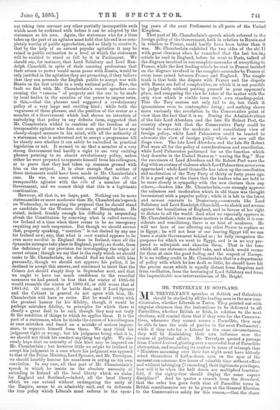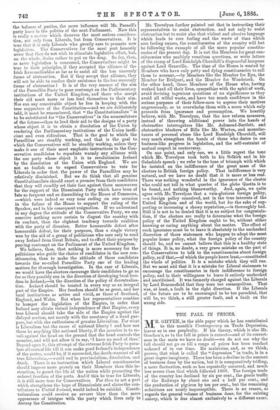MR. TREVELYAN IN SCOTLAND.
MR. TREVELYAN'S speeches at Selkirk and Galashiels should be studied by all the leading men in the new constituencies, whether Liberals or Tories. They pointed out with.
singular clearness that the instructions to be delivered to all Parnellites, whether British or Irish, in relation to the next elections, will remind them that if they vote for the Conservatives, whenever they cannot secure a Parnellite, they may be able to turn the scale of parties in the next Parliament ; while if they vote for a Liberal in the same circumstances, they will be diminishing their own influence over the course of political affairs. Mr. Trevelyan quoted a passage from United Ireland, gloating over a successful feat of Parnellite obstruction, and reminding its readers in tones of triumph that "Ministers mourning over their lost night must have bitterly asked themselves if half-a-dozen men on the spur of the moment can consume five hours of valuable time without effort and without infringing [?exceeding] their legitimate privileges, how will it be when the half dozen are multiplied fourteenfold, if the eighty-four should display the same superb discipline I" And he quotes a remark from the Standard, that the order has gone forth that all Parnellite votes in British constituencies are to be given at the General Election to the Conservatives solely for this reason,—that the closer the balance of parties, the more influence will Mr. Parnell's party have in the politics of the next Parliament. Now this is really a matter which deserves the most serious consideration, not only from Liberals, but from Conservatives. It is true that it is only Liberals who greatly care to promote new legislation. The Conservatives for the most part honestly avow that they do not wish to stimulate legislative effort, but, on the whole, desire rather to put on the drag. So far, then, as mere legislation is concerned, the Conservatives might be true to their principles, if they accepted the alliance of the Irish Irreconcileables so far as to assist all the less unseemly forms of obstruction. But if they accept that alliance, they will not be able to confine their assistance to the less unseemly forms of obstruction It is of the very essence of the aim of the Parnellite Party to pour contempt on the Parliamentary institutions of the United Kingdom, and those who accept their aid must more or less lend themselves to their aim. Nor can any conceivable object be less in keeping with the true supporters of the Constitution—and we are deliberately told, it must be remembered, that "the Constitutionalists " is to be substituted for "the Conservatives" in the nomenclature of the future—than to lend their aid to the designs of a party whose object it is to obtain a dissolution of the Union by rendering the Parliamentary institutions of the Union inefficient and even ridiculous. That is the goal to which the Parnellites are steadily working, and that is the goal to which the Conservatives will be steadily working, unless they make it one of their most emphatic instructions to the Conservative candidates to repudiate warmly any alliance with the one party whose object it is to revolutionise Ireland by the dissolution of the Union with England. We are not so foolish as to expect Conservatives to vote for Liberals in order that the power of the Parnellites may be relatively diminished. But we do think that all genuine Constitutionalists should exact a promise from their candidates that they will steadily set their face against those manceuvres for the support of the Disunionist Party which have been of 'Tate so frequent and so discrediting to the House of Commons, —which were indeed so very near ending on one occasion in the failure of the House to support the ruling of the Speaker, and in his consequent resignation. If we understand in any degree the attitude of the Conservative Party, we can conceive nothing more certain to disgust the country with its conduct, than the slightest tendency towards coalition with the party of disunion. Better honourable defeat after honourable defeat, for their purposes, than a single victory won by the aid of a group of politicians who care only to rend away Ireland from Great Britain, and to effect their purpose by pouring contempt on the Parliament of the United Kingdom.
We believe, then, that nothing is more necessary for the politicians who guide the choice of candidates in the new constituencies, than to make the attitude of those candidates towards the so-called Parnellite Party one of the leading matters for thorough investigation. In the case of Liberals, we would have the electors encourage their candidates to go as far as they possibly can in the direction of developing local freedom in „Ireland,—in the direction of the policy of decentralisation. Ireland should be treated in every way as an integral part of the Empire. Her freedom should be as great, and her local institutions as active and vivid, as those of Scotland, England, and Wales. But when her representatives combine to hamper the legislation of the Empire, in order that Ireland may obtain virtual independence of that Empire, every true Liberal should take the side of the Empire against the disloyal section, not merely with the constancy of a fixed purpose, but with the enthusiasm of genuine Liberalism. For what is Liberalism but the cause of national liberty ? and how can there be anything like national liberty, if the member is to revolt against the head on the ground that the head controls the. member, and will not allow it to say, 'I have no need of thee.' Depend upon it, this attempt of the extreme Irish Party to paralyse all central life till it can make good Ireland's independence of the centre, would be, if it succeeded, the death-warrant of all true Liberalism,--would end in provincialism, dissolution, and death. There is no instruction which Liberal constituencies should impress more gravely on their Members than this instruction, to guard the life of the nation while promoting the ordered freedom of the parts. And if this be true for Liberals, it is still more true for Conservatives. For them to act a part which strengthens the hope of Disunionists and elates the contributors to United Ireland, would indeed he suicidal. Constitutionalism could receive no severer blow than the mere appearance of intrigue with the party which lives only to destroy the Constitution. Mr. Trevelyan further pointed out that in instructing their representatives to resist obstruction, and not only to resist obstruction but to resist also that violent and abusive language which leads to sore feeling and the waste of time which sore feeling causes, the constituencies of the country will but be following the example of all the more popular constituencies of the present day. It is not the Members for great constituencies who multiply vexatious questions, or write letters of the stamp of Lord Randolph Churchill's disgraceful lampoon against Lord Granville.. The time of the House is wasted by Members who have only petty and dying constituencies to call them to account,—by Members like the Member for Eye, the Member for Midport, and the Member for Woodstock. On the other hand, those Members of the House who, having worked hard all their lives, sympathise with the spirit of work, avoid devising ingenious questions of no significance as they avoid all wilful waste, and have too much confidence in the serious purposes of their fellow-men to asperse their motives ungenerously, or to overwhelm them with a scorn which only proceeds from ignorance and presumption. We heartily believe, with Mr. Trevelyan, that the new reform measures, instead of throwing additional power into the hands of obstructive interrogators like Mr. Ashmead-Bartlett, and obstructive blockers of Bills like Mr. Warton, and manufacturers of personal abuse like Lord Randolph Churchill, will very much strengthen the hands of those who desire to see business-like progress in legislation, and the self-restraint of mutual respect in controversy. On one point, and only one, we a little regret the tone which Mr. Trevelyan took both in his Selkirk and in his Galashiels speech ; we refer to the tone of triumph with which he insisted on the indifference of the great mass of the electors to British foreign policy. That indifference is very natural, and we have no doubt that it is more or less real. There was nothing wonderful in the ignorance of the elector who could not tell in what quarter of the globe Quetta is to be found, and nothing blameworthy. And, again, we quite agree with Mr. Trevelyan that a vain-glorious foreign policy, —a foreign policy conceived, not in the true interests of the United Kingdom and of the world, but for the sake of supporting or increasing a showy reputation,—is thoroughly bad. Still it is not to be denied that it is no subject for congratulation, if the electors are really to determine what the foreign policy of the United Kingdom ought to be, without either knowing or caring anything about the matter. The effect of such ignorance must be to leave it absolutely to the unchecked discretion of those statesmen who happen to adopt the most popular home policy, what the foreign policy of the country should be, and we cannot believe that this is a healthy state of things. It is, no doubt, a very grave mistake on the part of the Conservatives to talk to the constituencies about foreign policy, as if that,—of which the people know least,—constituted the whole of politics. It is a mistake which they will rue. But we must add that it is a mistake for Liberal statesmen to encourage the constituencies in their indifference to foreign policy, and in their willingness to leave it entirely unchecked and uncriticised. It was formerly charged against the Liberals by Lord Beaconsfield that they were too cosmopolitan. That was, at least, a fault in the right direction. If the Liberals of the future are to be encouraged to be too parochial, that will be, we think, a still greater fault, and a fault on the wrong side.



































 Previous page
Previous page